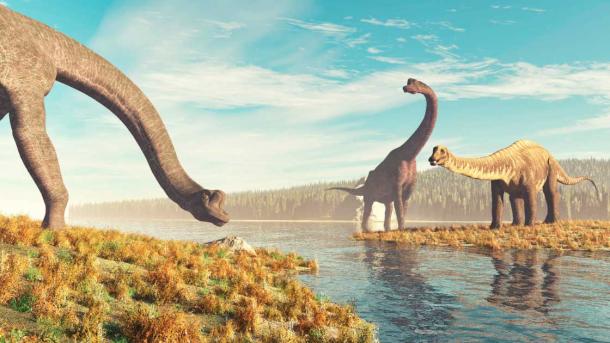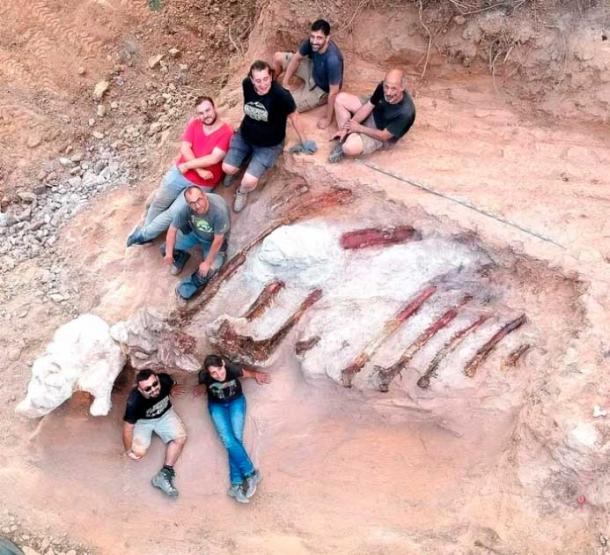The skeleton of a ginormous 82-foot (25-meter) long late-Jurassic dinosaur skeleton was found in central Portugal, which was accidentally unearthed in a man’s backyard in the city of Pombal back in 2017. Paleontologists working at the site believe it to be the largest dinosaur fossil ever found in Europe, at a whopping height of 39 feet (12 meters).
Europe’s largest ever dinosaur fossil has been described as a “beautifully preserved specimen,” after a series of digs over the past five years. There are plans to return early next year, with other parts of the skeleton potentially still present in the deposit, as gauged from the preservation characteristics of already discovered dinosaur bones from 150 million years ago.
Europe’s Largest Ever Dinosaur Fossil: A Huge Vegetarian
Last week, Spanish and Portuguese archaeologists announced that this skeleton was a sauropod in a press release by the University of Lisbon. Sauropods are herbivorous quadrupedal dinosaurs, with long, elongated necks and tails, and thick, trunk-like legs. Sauropods are a large and diverse group characterized as some of the largest creatures to have roamed the earth.

The largest ever dinosaur fossil in Europe, from the Late Jurassic period, is attracting a lot of attention. The huge beast looked like these sauropods. ( allvision / Adobe Stock)
“The research in the Monte Agudo paleontological locality confirms that the region of Pombal has an important fossil record of Late Jurassic vertebrates, which in the last decades has provided the discovery of abundant materials very significant for the knowledge of the continental faunas that inhabited the Iberian Peninsula about 145 million years ago,” said Dr. Malafaia, Postdoctoral researcher at the Faculty of Sciences of the University of Lisbon (Ciências ULisboa), Portugal.
Portugal has proven to be a particularly rich region for dinosaur fossils. In 1947, brachiosaurad remains were found at Atalaia, leading to the coinage of the subgenus brachiosaurus atalaiensis in 1957.
The vertebrae and ribs recovered from the axial skeleton in the backyard in Portugal indicate that it was a brachiosaurid. The ribs measured a whopping 3 meters (10 feet) in length, which are the largest sauropod ribs found so far in Europe.
“It is not usual to find all the ribs of an animal like this, let alone in this position, maintaining their original anatomical position. This mode of preservation is relatively uncommon in the fossil record of dinosaurs, in particular sauropods, from the Portuguese Upper Jurassic,” added Dr. Malaifa.
Just a month ago, two 100-million-year-old sauropod footprints were discovered outside a restaurant in China, as per a CNN report. This restaurant was located in Leshan in Sichuan province, and the footprints suggested that the creatures were 26 feet (8 meters) long. They roamed the early in the early Cretaceous period, which followed the Jurassic era, and likely shook the earth when they walked by.

The dig team in the now transformed backyard in Portugal posing next to the ribs of the largest ever dinosaur fossil found in Europe. (Photo courtesy of Instituto Dom Luiz / Faculty of Sciences of the University of Lisbon)
Sauropods and Brachiosaurs and their Jurassic Era Extinction
Brachiosaurs are a genus of sauropod dinosaur who roamed the earth during the late Jurassic era till the early Cretaceous period, between 160 million and 66 million years ago, reported The Insider . The region of Pombal has proved to be a very fruitful Iberian Peninsula fossil location, helping shed new light on a plethora of fauna that inhabited the peninsula during the late Jurassic (163 mya – 145 mya).
Compared to other sauropods, brachiosaurs have longer forelimbs compared to their hindlimbs, which makes their torso larger and their tale shorter in terms of overall proportions.
Brachiosaurs are generally characterized by markedly developed forelimbs, as the most emblematic dinosaur species belonging to the sauropods. These include Brachiosaurus altithorax and Giraffatitan brancai , as well as the Portuguese Late-Jurassic species, Lusotitan atalaiensis, found in Portugal’s west region.
Two massive extinction events ended life on earth for big dinosaurs. The first occurred 201 million years ago (the Triassic-Jurassic extinction), which led to the extinction of 80% of the earth’s species. The second extinction event happened 66 million years ago (the Cretaceous-Paleogene extinction), which wiped out 75% of the earth’s species.
The latter Cretaceous-Paleogene extinction event is loosely known as the “day the dinosaurs died,” when a massive asteroid crashed into the Yucatan Peninsula in modern day Mexico creating a 180-kilometer (112-mile) wide and 19-kilometer (11.8-mile) deep hole. This event ended the 180 million year reign of the dinosaurs, according to a Live Science report.
Top image: The largest ever dinosaur fossil in Europe, from a huge sauropod dinosaur, during excavations. Image: Photo courtesy of Instituto Dom Luiz / Faculty of Sciences of the University of Lisbon.